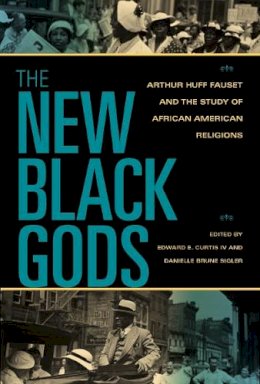
Stock image for illustration purposes only - book cover, edition or condition may vary.
The New Black Gods. Arthur Huff Fauset and the Study of African American Religions.
. Ed(S): Curtis, Edward E., Iv; Sigler, Danielle Brune
€ 35.07
FREE Delivery in Ireland
Description for The New Black Gods. Arthur Huff Fauset and the Study of African American Religions.
Paperback. Taking the influential work of Arthur Huff Fauset as a starting point to break down the false dichotomy that exists between mainstream and marginal, this title features a new generation of scholars who offer fresh ideas for understanding the religious expressions of African Americans in the United States. Editor(s): Curtis, Edward E., IV; Sigler, Danielle Brune. Series: Religion in North America. Num Pages: 288 pages, black & white illustrations. BIC Classification: 1KBB; HRAC; JFSL3. Category: (UP) Postgraduate, Research & Scholarly. Dimension: 5969 x 3963 x 21. Weight in Grams: 435.
Read more
Taking the influential work of Arthur Huff Fauset as a starting point to break down the false dichotomy that exists between mainstream and marginal, a new generation of scholars offers fresh ideas for understanding the religious expressions of African Americans in the United States. Fauset's 1944 classic, Black Gods of the Metropolis, launched original methods and theories for thinking about...
Product Details
Format
Paperback
Publication date
2009
Publisher
Indiana University Press United States
Number of pages
288
Condition
New
Series
Religion in North America
Number of Pages
288
Place of Publication
Bloomington, IN, United States
ISBN
9780253220578
SKU
V9780253220578
Shipping Time
Usually ships in 7 to 11 working days
Ref
99-50
About . Ed(S): Curtis, Edward E., Iv; Sigler, Danielle Brune
Edward E. Curtis IV is Millennium Scholar of the Liberal Arts and Associate Professor of Religious Studies and American Studies at Indiana University–Purdue University Indianapolis. He is author of Islam in Black America and Black Muslim Religion in the Nation of Islam, 1960–1975. He is editor of the Columbia Sourcebook of Muslims in the United States. Danielle Brune Sigler is...
Read moreReviews for The New Black Gods. Arthur Huff Fauset and the Study of African American Religions.
Most authors dedicate their books to family members or inspirational figures. IUPUI professor Edward Curtis has dedicated his latest volume, The New Black Gods: Arthur Huff Fauset and the Study of African American Religions (IU Press, 2009) to the IU School of Liberal Arts at IUPUI. 'I wanted to give credit where the credit was due,' said Curtis, faculty member...
Read more